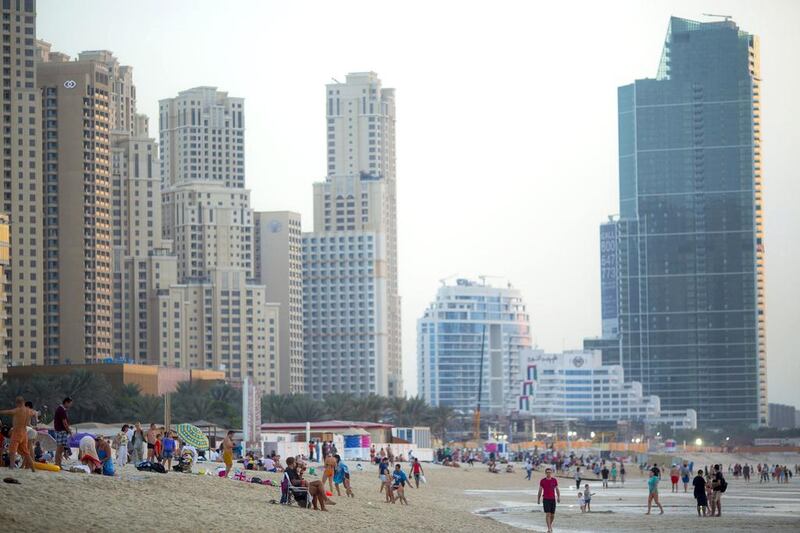Dubai’s rampant house price growth is slowing as government measures to cool the market kick in.
According to the property broker Cluttons, average house prices in Dubai grew by 8 per cent during the three months to the end of September – a respite from the 23 per cent increase the company reported for the previous three months.
In its property market report published yesterday, Cluttons said that average Dubai property prices are now 53 per cent higher than a year ago and 47 per cent above the bottom of the 2009 market.
Cluttons’ findings show higher rises in property prices than comparable research by Jones Lang LaSalle, which reported an average gain of 6 per cent for the third quarter. But Cluttons’ report of a 3 per cent average rise in Dubai rents was half the rate that Jones Lang LaSalle found.
Cluttons found that prices rose most rapidly in Dubai Marina, where they gained 10.1 per cent, and in the Emirates Living neighbourhood, where they rose 8.7 per cent during the quarter.
The broker said the slower rate of growth could be attributed to Dubai Land Department’s decision in September to double the transfer fee on each sale from 2 per cent to 4 per cent. The move was made to reduce the number of so-called property flippers who buy off-plan flats and then sell them almost immediately to capitalise on the rising market. The phenomenon has been blamed for inflating house prices in the emirate in the years before the housing crash.
Yet with mortgage rates falling to between 4 and 5 per cent, down from an average of about 7 per cent five years ago, Cluttons said there had been an uptick in buyers taking out mortgage finance – both long-term buy-to-let investors and owner-occupiers.
“Although the long-term effect remains to be seen, short-term indicators show that recent regulation appears to be stemming further sharp increases in property prices,” said Steve Morgan, the head of Cluttons Middle East. “Rather than being fuelled by ‘fly-by dealers’, current demand is primarily being driven by a growing population and rising employment levels.”
Nonetheless, Cluttons said that cash buyers continued to dominate the market. The broker reported that in a recent study of purchasers at Dubai Marina, it found three cash buyers for every two mortgage buyers.
Dubai's rents, which had been rising sharply earlier in the year, are also growing at a slower rate, Cluttons found. It said that rents increased by 3 per cent during the three months to the end of September – down from the 8 per cent it reported for the previous quarter.
Villa rents increased by an average of 3.2 per cent over the period – faster than apartment rents, which increased by an average 2.7 per cent. However, Cluttons added that rents for studio apartments in cheaper areas such as Discovery Gardens and International City increased by a startling 9.9 per cent over the period.
Cluttons said that recent house price and rent rises in Dubai had brought the market to a “tipping point” which could prompt Abu Dhabi private-sector employees who had moved to Dubai in search of cheaper rents to return to the capital.
“Aside from the demand driven by the federal Government’s decree requiring all public sector workers working in Abu Dhabi to reside in the emirate as of September, there is a trend in demand stemming from people relocating from Dubai,” Mr Morgan said. “They are seeking more affordable rents and see this return as a preferable alternative to downgrading in Dubai.”
In the limited market of Abu Dhabi’s freehold areas, Cluttons reported that property prices continued to gain momentum. It said average prices rose by a sharp 14.4 per cent during the three months to the end of September, following average increases of 11.2 per cent during the second quarter.
However, the broker added that Abu Dhabi’s average rents rose by just 1 per cent during the period, a slowdown from the 4.5 per cent increase the previous quarter, as new flats hit the market.
lbarnard@thenational.ae





